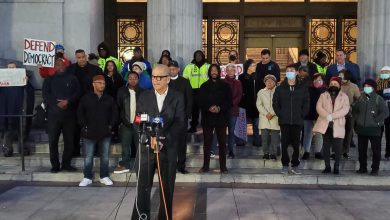D.A. Pamela Price Says Recycling Company Will Face Up to $33 Million in Fines for Oakland Scrap Metal Fire

By Magaly Muñoz
Oakland has taken a big step towards securing funds that will save the city from major budget cuts by signing a term of agreement for the sale of the Coliseum stadium.
Mayor Sheng Thao and City Administrator Jestin Johnson signed the term agreement with the African American Sports and Entertainment Group (AASEG) on Tuesday morning. The agreement lays out the plan for the sale including payment scheduling and deed restrictions.
“What we’ve done today is we’ve changed for the better, because what we’re doing is we’re investing not just in today, but we are investing in an Oakland for tomorrow,” Thao said at a Tuesday morning press conference.
The sale of Oakland’s half-ownership of the stadium to AASEG was announced in late May and was painted as a way to help save the city from the large deficit they battled with for weeks in June.
The city council passed a budget dependent on the sale, avoiding cuts across all departments, particularly to departments responsible for public safety like the police and fire departments.
Had the sale fallen through, cuts would’ve needed to be immediately made in September to bridge the shortfall, but this new agreement brings a sense of security and victory for officials who would’ve needed to make the hard decisions.
With the funds, the city can maintain 678 sworn officers on the streets, fund crime reduction teams, graduate three police academies and keep all fire stations operational.
About $60 million from AASEG will be paid out to the city over the 2024-25 fiscal year. A deposit of $5 million is due within five days of signing the purchase agreement. Following the deposit, the group will pay $10 million by Sept. 1, $15 million by Nov. 1, and $33 million by Jan. 15, 2025.
The remaining $42 million is due no later than June 30, 2026.
“We will always stick forward, and we will move this process forward because our families, our community, depends on it and so we’re here. We’re committed to it,” Ray Bobbitt, founder of AASEG, said on Tuesday.
Bobbitt, an Oakland native, assured his commitment to the city and bringing new opportunities to the area. He added that the investment into public safety, the biggest concern for residents, is equally as important to address during this process.
The other half of the ownership for the Coliseum is held by the Oakland A’s baseball team, who are playing their last season at the ballpark before temporarily moving to Sacramento while the team builds a stadium in Las Vegas. They bought this half from Alameda County.
Bobbit said AASEG is “very much in constant communication” with the A’s to purchase their half of the stadium, but no further details were offered on when a deal will be officially on the table.
The A’s and the city went through a lengthy battle to get the team to stay when their lease for the stadium was finishing up, but Oakland could not convince the baseball team to stay. The fallout has led to bitterness and upset amongst the community who has long supported the team and is on their third professional sports team loss.
Council president Nikki Fortunato-Bas said at the Tuesday city meeting that Oakland had previously tried to negotiate with Alameda County to not sell, but they ultimately went through with their own deal.
“This is an investment in Oakland and the region today. It’s also an investment in the future, and like you heard from Mr. Bobbitt, it is also an investment in public safety,” Fortunato-Bas said.
“Today is the start of a boom loop here in Oakland!”





